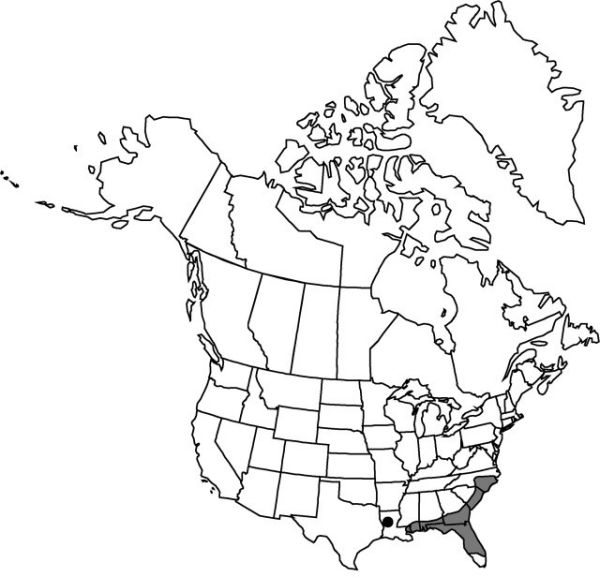Difference between revisions of "Calopogon barbatus"
Orchidaceae 2: 272. 1908.
imported>Volume Importer |
GeoffLevin (talk | contribs) m (Fixed typo in synonyms) |
||
| Line 20: | Line 20: | ||
}} | }} | ||
|synonyms={{Treatment/ID/Synonym | |synonyms={{Treatment/ID/Synonym | ||
| − | |name= | + | |name=Calopogon parviflorus |
| − | |authority= | + | |authority=Lindley |
|rank=species | |rank=species | ||
}} {{Treatment/ID/Synonym | }} {{Treatment/ID/Synonym | ||
| − | |name= | + | |name=Calopogon parviflorus |
|authority=Rafinesque | |authority=Rafinesque | ||
|rank=species | |rank=species | ||
}} {{Treatment/ID/Synonym | }} {{Treatment/ID/Synonym | ||
| − | |name= | + | |name=Calopogon pulchellus var. graminifolius |
|authority=Elliott | |authority=Elliott | ||
|rank=variety | |rank=variety | ||
}} {{Treatment/ID/Synonym | }} {{Treatment/ID/Synonym | ||
| − | |name=Helleborine | + | |name=Helleborine graminifolia |
| − | |authority= | + | |authority=(Elliott) Kuntze |
|rank=species | |rank=species | ||
}} {{Treatment/ID/Synonym | }} {{Treatment/ID/Synonym | ||
| Line 71: | Line 71: | ||
|rank=species | |rank=species | ||
|parent rank=genus | |parent rank=genus | ||
| − | |synonyms= | + | |synonyms=Calopogon parviflorus;Calopogon pulchellus var. graminifolius;Helleborine graminifolia;Limodorum graminifolium;Limodorum parviflorum |
|basionyms=Ophrys barbata | |basionyms=Ophrys barbata | ||
|family=Orchidaceae | |family=Orchidaceae | ||
Latest revision as of 16:19, 14 December 2022
Plants 11–34 cm at flowering, 13–57 cm at senescence. Corms globose to elongate, rarely forked, 13–26 mm. Leaves closely appressed to inflorescence at flowering; blade linear, 7–22 cm × 2–5.5 mm, later elongating to 12–54 cm. Inflorescences green or slightly purple at base, rarely entirely purple, becoming entirely green after flowering, 11–34 cm, later elongating to 13–57 cm; floral bracts 2–4.5 mm. Flowers 1–12, less than 1 cm apart, opening nearly simultaneously, magenta, pink, or rarely white, without fragrance; dorsal sepal obovate to oblanceolate, 12–20 × 4–9 mm, apex acuminate; lateral sepals distally reflexed to straight, ovate to moderately lanceolate, weakly falcate to straight, 11–16 × 5–9 mm, apex apiculate to acuminate; petals obpandurate, 11–16 × 4–6 mm, apex obtuse; lip 7–13.5 mm, dilated apex of middle lobe triangular to quadrangular, broadly rounded, 7–11 mm wide, apex retuse or apiculate; column 6–9 × 1.5–2 mm, distal end 5–8 mm wide; rostellum present. Capsules ovoid to ellipsoid, 12–17 × 4.5–6 mm. 2n = 40, 42.
Phenology: Flowering spring, seldom winter (s Fla), late spring in north (Jan–Jun).
Habitat: Moist, acidic, sandy pine savannas and grasslands
Elevation: 0–100 m
Distribution

Ala., Fla., Ga., La., Miss., N.C., S.C.
Discussion
Calopogon barbatus can be distinguished from other Calopogon species by its narrow leaf closely appressed to the inflorescence at flowering, relatively closely spaced flowers that open nearly simultaneously, general lack of floral fragrance, and the significant elongation of leaves and aboveground stems over the growing season. Calopogon barbatus also flowers earlier than other species within its range except C. oklahomensis. Specimens of plants from Texas and most from western Louisiana that have been identified as C. barbatus are actually C. oklahomensis (D. H. Goldman 1995). Calopogon barbatus, however, is found in western Louisiana, although local and most infrequent (W. C. Holmes and P. S. Mathies 1980).
The type specimen for the basionym of Calopogon barbatus, Ophrys barbata Walter, is actually C. multiflorus (D. H. Goldman 1998). The name Ophrys barbata, however, has been proposed for conservation (R. K. Brummitt 2000), in which case no nomenclatural change will be necessary.
Selected References
None.